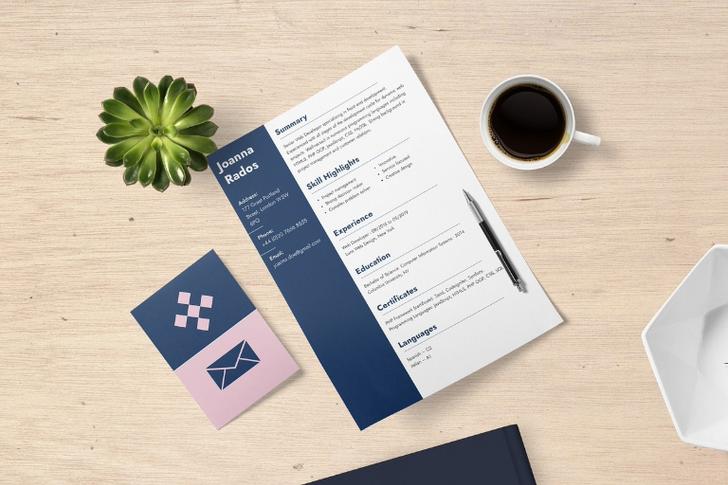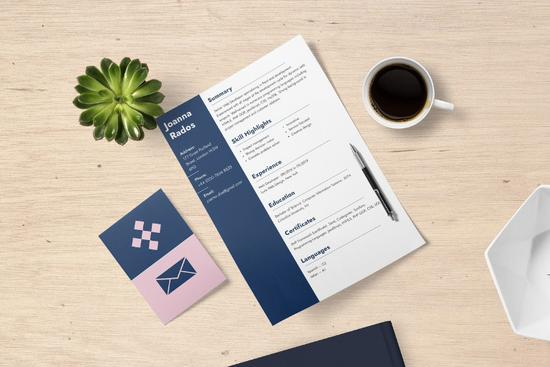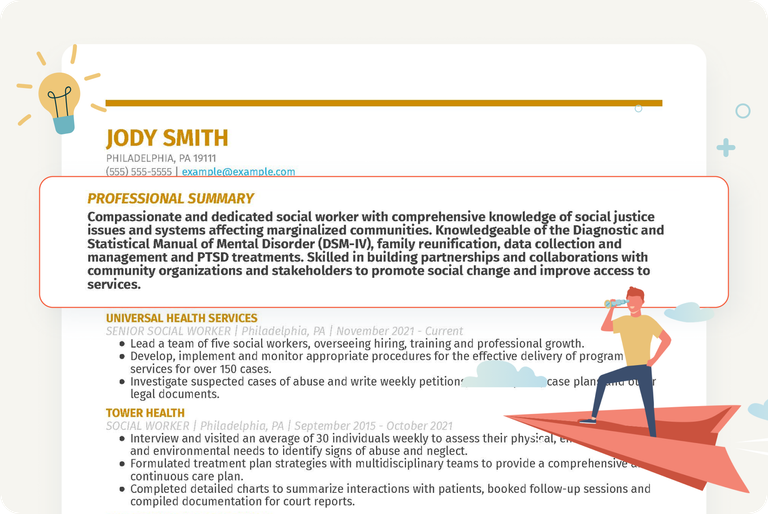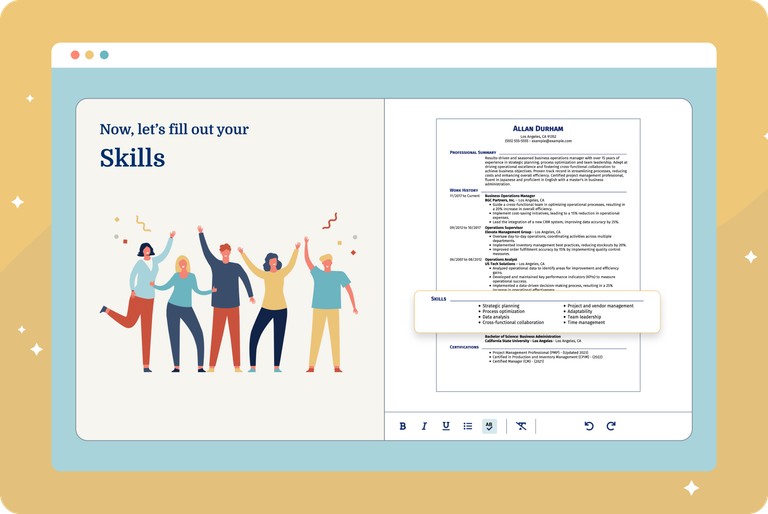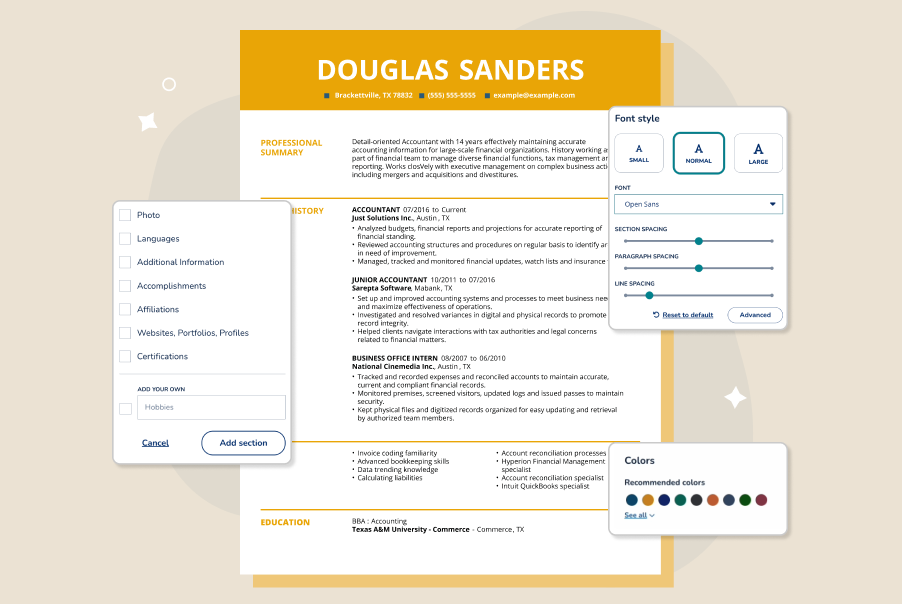Our customers have been hired at: *Foot Note
The length of your resume is an important consideration for crafting a job application that stands out to hiring managers and wins interviews.
Too long, and it may overwhelm the reader; too short, and it might not adequately showcase your qualifications and experience. This begs the question: how long should a resume be?
We’ll discuss how to determine the optimal resume length based on key factors such as career stage and industry standards so that you can build a compelling resume and get hired faster.
How many pages should a resume be?
You can use our Resume Builder to easily adjust the content and formatting of your document to fit the length that best suits your skills and background.
A typical resume should be one or two pages long, depending on your level of experience and industry norms. Consider the guidelines below while crafting your resume:
When to use a one-page resume
A one-page resume is ideal for concisely highlighting your most relevant qualifications and allowing recruiters to quickly grasp your suitability for the role.
This length is the preferred option for early-to-mid-career professionals with less than ten years of experience or career changers who have limited experience in the field they are moving to.
- Concise and focused: The one-page limit ensures that you present your relevant skills and qualifications using clear and concise language.
- Easy to scan: A one-page format makes it easier for recruiters and hiring managers to locate essential skills, experiences and achievements at a glance.
- Shows strong communication skills: Crafting a one-page resume demonstrates the ability to condense information effectively and present qualifications concisely.
- Emphasizes key achievements: This length allows you to highlight your most significant achievements in a brief yet impactful manner.
- Encourages tailoring: The limited space encourages you to tailor your resume to the job description, which can increase your chances of securing an interview.
Use one of our professionally designed resume templates to take the guesswork out of formatting your resume.
Who should use a two-page resume
Two-page resumes are becoming more widely accepted by hiring managers and are a popular choice for job seekers in various career stages.
A two-page resume is an excellent choice for professionals with over ten years of experience or for those with five to ten years of highly relevant experience that will not fit on a single page.
Here is an example of a compelling two-page resume:
- Comprehensive presentation: Two-page resumes allow you to provide a more thorough overview of your career history, professional skills and accomplishments.
- Details career progression: Two pages provide space to detail career progression, highlighting promotions, leadership roles and significant projects.
- Showcases skills and accomplishments: You can include a wider range of skills, accomplishments and relevant details such as publications or technical expertise.
- Demonstrates depth of expertise: A two-page resume allows you to delve deeper into technical skills, industry knowledge and relevant achievements.
- Meets industry standards: In some industries or for senior-level positions, a two-page resume is expected by recruiters accustomed to more detailed applicant profiles.
If your resume is two pages, ensure that the second page is at least half full. A two-page resume with a sparse second page can look incomplete. Fill the entire second page for a polished and professional look.
Is a three-page resume acceptable?
A three-page resume is rarely necessary and is generally too detailed for most job applications and career stages.
However, in certain specialized circumstances, individuals with extensive and highly relevant experience or accomplishments might consider a three-page resume.
Here are some situations where a three-page resume might be appropriate:
- Academic or scientific research: Professors, researchers or scientists with numerous publications, grants, projects and academic achievements.
- Senior executives or C-level positions: Candidates at the executive level with extensive leadership experience, board memberships and a robust career history.
- Federal or government applications: In some cases, federal or government job applications may request or expect more detailed information.
- Consultants or freelancers: Freelancers or consultants who have worked on a variety of projects across different industries and want to highlight their diverse portfolios.
- Technical or engineering fields: Professionals in technical roles such as engineers, architects or IT specialists with a wide range of technical skills and certifications.
Candidates in these fields or roles may opt for a CV rather than a resume. Use our CV Maker to quickly and easily craft a job-winning application.
Use our ATS Resume Checker to scan your resume for 30+ common issues and receive instant optimization suggestions to improve your resume score.
Factors that influence resume length
Ultimately, the length of your resume depends on your unique situation. Explore key considerations for determining the length that best suits your professional background.
Career stage
The length of your resume should align with the depth and relevance of your experience. Here are a few considerations when deciding how long your resume should be:
- Entry-level candidates: For entry-level positions, a one-page resume is ideal for highlighting education, internships, skills and any relevant coursework.
- Mid-level professionals: Candidates with more than 5-10 years of experience may find that a two-page resume helps detail their career progression and key accomplishments.
- Experienced professionals: Professionals including over 20 years of work experience on a resume may require three or more pages for a comprehensive look.
- Career changers: Individuals transitioning to a new field may also benefit from a longer resume if they have a diverse background with transferable skills and accomplishments.
Industry expectations
Industry expectations play an important role in determining the appropriate resume length. Here's how industry expectations can influence the length of your resume:
- Conventional industries (e.g., finance, law): Industries such as finance and law often expect more traditional resume formats, typically favoring shorter resumes. In these fields, a one-page or concise two-page resume is usually preferred.
- Creative industries (e.g., design, advertising): Resumes for these industries might vary more in length, with some professionals opting for longer formats (e.g., two to three pages) to showcase a diverse range of projects, designs or campaigns.
- Technical industries (e.g., engineering, IT): Technical roles may require resumes that highlight specific technical skills, certifications and project details. Candidates in these industries may find a two-page resume more suitable to showcase their expertise.
- Academic or research fields: In academia, CVs (curriculum vitae) are common and can be longer than traditional resumes. These documents detail publications, research grants, conference presentations and more.
Browse our library of 800+ resume examples for industry-specific samples crafted by professional designers and Certified Professional Resume Writers.
Relevance of experience
The relevance of your experience impacts the amount of detail you should include in your resume. Here’s how experience impacts the length of your resume:
- Highly relevant experience: This might mean using a two-page resume to adequately showcase how your background fits the role.
- Moderately relevant experience: In these cases, a one-page resume emphasizing transferable skills and accomplishments could be sufficient.
- Less relevant experience: You may opt to only briefly mention or omit less relevant experience, resulting in a one-page resume that focuses on other areas or skills.
- Career changes: A one-page resume will typically suffice when focusing on transferable skills and accomplishments that relate to the new role or industry.
Tips for achieving the ideal resume length
Follow the tips below to ensure that your resume is the ideal length for your industry and career level. We also recommend exploring the various resume formats for additional guidance.
Use clear and concise language
Use simple, straightforward language that is easy to understand. Avoid industry-specific jargon or acronyms unless they are widely understood and directly relevant to the position.
Ensure each sentence contributes directly to showcasing your qualifications and remove filler words as needed. Here are some common filler words and phrases to look out for:
- Very: Instead of saying "very good," use "excellent" or another more specific adjective.
- Quite: Often unnecessary; consider if it adds meaning or clarity.
- Basically: Can usually be omitted without changing the meaning.
- Actually: Similar to "basically," it often doesn't add essential information.
- In order to: Simplify to "to" in most cases.
- That: Check if the sentence makes sense without it.
- Just: Often used unnecessarily, as in "just completed;" consider removing it.
Begin bullet points with strong action verbs such as "achieved," "implemented" and "managed” to reduce wordiness and increase the impact of your resume.
Prioritize relevant experience
In general, you should only include the past 10-15 years of work experience on your resume, unless you have additional experience that is highly relevant to the role you are applying for.
Focusing on relevant professional experience ensures that you customize your resume for the role and employer and avoid increasing your resume’s length unnecessarily.
Also, ensure that key details are prominently displayed by including the most important and relevant information at the top of your resume and at the beginning of sections or bullet points.
Incorporate keywords
Study the job description closely and include keywords that align with your background and qualifications. Here are a few examples of keywords to look out for:
- Skills and expertise: Industry-specific knowledge, technical skills or language proficiency required for the role.
- Certifications: Specialized certifications or related courses that are listed in the job description.
- Educational credentials: Educational background or degree requirements noted in the job description.
- Work experience: Related experience that the employer is looking for in potential candidates.
Incorporating keywords into your document is an essential step in crafting an ATS-friendly resume that will pass automated resume screening systems and reach hiring managers.
Highlight accomplishments
Ensure that your resume is succinct and compelling by focusing on your most relevant accomplishments from past roles.
Where possible, quantify your accomplishments with specific numbers or percentages. For example, instead of saying "improved sales," specify "increased sales by 20%."
Rather than listing every responsibility or job duty from past roles, include three to five achievements per job, and keep each bullet point to one or two lines. For example:
Software Engineer
XYZ Tech Solutions | New York, NY | Jan. 2018 - Present
- Led a cross-functional team of 5 engineers to successfully deliver a critical feature, reducing average customer support response time by 30%.
- Designed and implemented a scalable microservices architecture, resulting in a 20% improvement in system reliability and a 15% reduction in server costs.
- Collaborated with product management to launch a new mobile app, achieving 1 million downloads within the first 6 months and a 4.5-star rating on app stores.
See how to write a resume for tips on highlighting key achievements and experiences that set you apart from other applicants.
Adjust the formatting
Adjusting the formatting and design of your resume is an effective way to either reduce or extend the page count and improve the visual impact of your document.
- Organize information into concise bullet points rather than dense paragraphs. This will help recruiters scan your resume quickly and find key information.
- Adjust your resume font size between 10 and 12 points to reduce your document to one page or to fill out a second page that has too much white space.
- Reduce line spacing to 1.2 or even 1.0 to condense content into a single page. Remember not to make it too compact, as readability is critical.
- Standard margins are usually around 1 inch on all sides. You can try reducing them to 0.75 or 0.5 inches, but ensure the content doesn't look cramped.
- Consider a two-column resume format to fit more information into a single page and increase the visual interest of your resume.
- Remove extra spaces between sections or paragraphs to make the content more compact, or add space for breathing room and extend to a second page.
Key takeaways
- The ideal resume length can vary depending on the extent and relevance of your experience and industry standards.
- Generally, a one-page or two-page resume is ideal for candidates across various industries and career stages.
- Focus on content quality over document length. To stand out, tailor your skills and experience to the job you are applying for.
FAQ
How far back should a resume go?
The general rule of thumb for how far back a standard U.S. resume should go depends on your experience level and the information’s relevance. Here are some guidelines:
- Entry-level candidates: Typically include experiences from the last three to five years. If you have earlier experiences that are highly relevant (such as internships or projects), you can include them even if they exceed this time frame.
- Mid-level to experienced professionals: Include experiences from the last 10-15 years. Focus on recent, relevant roles that showcase your skills and achievements. Older experiences can be summarized briefly.
- Senior-level executives or academics: Include all relevant experiences, but prioritize recent and impactful roles. A longer resume or CV is acceptable, especially in industries like academia or research.
Use a resume outline to tailor your resume accordingly, highlighting recent and relevant experiences that demonstrate your skills and achievements effectively.
How long should a typical resume be?
A typical resume should be one to two pages. See what to put on a resume for additional details about the content to include in your document.
Including enough information to showcase your qualifications effectively without overwhelming the reader is key. Always prioritize clarity, readability and relevance to the job.
Tailoring your resume to each specific job application ensures you highlight the most relevant skills and experiences, increasing your chances of catching the employer’s attention. Our Google resume examples demonstrate how to customize your resume for a specific employer.
See our resume profile examples and resume About Me examples for guidance on introducing yourself succinctly and effectively in your resume.
How long should a resume be for 20 years of experience?
A two to three-page resume is generally appropriate for someone with 20 years of experience. This allows you to cover your work history, key accomplishments and skills adequately.
Focus on highlighting your most recent and relevant experiences. Include detailed descriptions of your roles, key achievements, leadership roles and any significant projects you’ve managed.
Your resume should remain clear, concise and well-organized despite its extended length. Use bullet points, action verbs and quantifiable achievements to showcase your accomplishments.
See what a resume should look like for additional guidance and examples from career advice experts.
Is two pages too long for a resume?
Two pages are generally acceptable for a resume, especially for mid-level to senior-level professionals or those with extensive experience. Here are some considerations:
- Relevance: Include information directly relevant to the job you’re applying for. Tailor your resume to highlight relevant skills, experiences and achievements.
- Clarity and conciseness: Even with two pages, it’s important to maintain clarity and conciseness. Use bullet points, concise sentences and active verbs.
- Visual appeal: Ensure your resume is visually appealing and easy to navigate. Use consistent formatting, appropriate margins and a readable font size.
The key is to strike a balance between providing enough information to showcase your qualifications and keeping the content focused and concise.
See our ChatGPT resume prompts for tips on how to effectively use AI to assist the resume writing process.
Is it OK to have a three-page resume?
Having a three-page resume is generally not recommended unless you are in a specific industry or at a senior level where detailed information is expected.
In some fields like academia, research or certain technical professions, longer resumes are common and expected.
These documents can be several pages long to accommodate detailed lists of publications, projects, conferences and other professional activities.
Executives, senior managers or professionals with extensive experience may also have longer resumes to adequately showcase their strategic initiatives and career accomplishments.
We recommend using an AI resume builder to quickly and easily craft a resume that is the ideal length for your experience level.
What is the 30-second rule for a resume?
The “30-second rule” for a resume refers to the idea that a recruiter or hiring manager typically spends about 30 seconds initially scanning a resume. Here’s how you can stand out:
- Clear and concise format: Ensure your resume is well-organized with clear headers, bullet points and concise descriptions of your skills and experiences.
- Highlight key information: Place your most relevant qualifications, achievements and skills prominently at the beginning of each section.
- Tailor to the job: Customize your resume for each job application by emphasizing skills and experiences that match the specific requirements of the position.
- Quantify achievements: Whenever possible, use numbers and metrics to quantify your achievements to demonstrate measurable impact.
Check out how to update your resume for quick tips to improve the content and organization of your resume to quickly catch the attention of recruiters and hiring managers.
Is a 1.5-page resume OK?
A 1.5-page resume can look incomplete and unprofessional. In this case, it is best to reduce it to a single page or extend it to a full two pages.
To condense a 1.5-page resume into a single page, begin by reviewing each section critically. Remove older or less relevant roles, summarizing them briefly if necessary.
Consolidate sections like skills and education, prioritizing those most pertinent to the position. Adjust margins, font size and spacing to optimize space without sacrificing readability.
To extend a 1.5-page resume to two pages, you can strategically expand on relevant details and accomplishments while maintaining clarity and readability.
Include additional relevant skills, certifications or professional affiliations that further demonstrate your qualifications for the targeted position.
Is it OK if my resume is half a page?
A half-page resume is generally not ideal for most situations. It may not provide enough space to showcase your skills, experiences and achievements adequately.
Resumes that are too short may appear sparse or lacking in content, making it difficult for recruiters or hiring managers to assess your suitability for the role.
Aim for a resume length of at least one page to provide enough space to effectively present your qualifications and make a compelling case for why you are a strong candidate for the job.
If your resume is consistently short, explore how to write a resume with no experience to expand its content and strengthen your application.
Our customers have been hired at:*Foot Note

